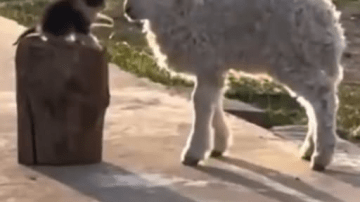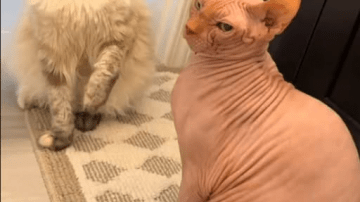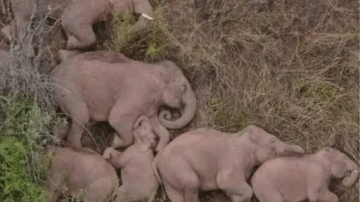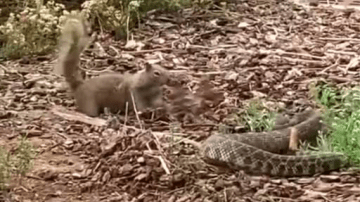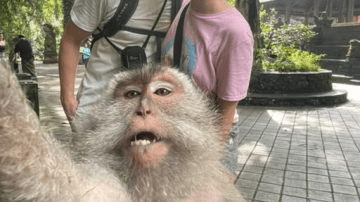The sun was sinking behind a horizon clouded with smoke. The air was thick with the echo of distant gunfire and the faint hum of drones circling above. In the midst of chaos and rubble, one small corner of the battlefield hid a quiet story — one that spoke not of hate or war, but of loyalty, love, and a bond that refused to break even in death.

For three months, drone footage from the front line revealed something extraordinary. Amid explosions and ruins, a soldier crouched in the shadows, carefully tearing open his ration pack. But instead of eating first, he set aside a portion — tiny scraps of meat and bread — and offered them to a stray cat that had begun visiting him.
The cat, small and gray, had no name in the official reports, but the soldiers had started calling her Mila.
Each day, she came closer. Each day, the soldier waited. And slowly, through the violence and fear, an unlikely friendship bloomed.
A Bond Born in the Ruins
In a world where survival meant suspicion, the soldier trusted the cat — and the cat trusted him.
At first, she watched him from a distance, her tail twitching as bullets cracked in the distance. But hunger overcame fear. The soldier crouched lower, whispering softly, offering his hand. She inched forward, step by cautious step, until her small paws rested against his boot.
From that moment, they were inseparable.
He shared his meals; she shared her warmth. When the nights grew cold, he tucked her inside his jacket, close to his chest. When he wrote letters he’d never send, she curled on his lap, purring softly over the paper as if to remind him that there was still gentleness left in the world.
His comrades teased him, calling Mila his “guardian angel.” But when the fighting was at its worst, it was often the cat who kept the men grounded — a fragile symbol of life among so much destruction.
The Final Battle
Winter crept closer, bringing with it frost, hunger, and the sound of advancing forces. The soldier — whose name was later identified as Sergeant Alexei Morozov — knew the front line was about to fall.
Still, he refused to leave. “Someone has to protect her,” he said quietly one night, as his squad prepared for the inevitable assault.
They told him she’d be fine. That she’d run. But he knew better. Mila never left his side, not even when the shells fell too close.
The morning of the final attack, the drone captured one last glimpse — Alexei crouched in the rubble, wrapping Mila in his jacket as he loaded his rifle. He pressed his forehead to hers for a brief second. She blinked slowly, trusting him, unaware that it would be the last time.
Hours later, the footage ended.
The Note
When medics finally reached the position, the battle was over. Smoke rose from the trenches; silence hung where life had been. They found Alexei’s body exactly where the drone had last seen him — his hand resting protectively over his chest.
Inside his jacket, nestled against his heart, was Mila — alive, trembling, and refusing to move.
And in the inner pocket, folded neatly beside her, was a note. The ink had bled from sweat and rain, but the words were still legible:
“I know they are approaching. I’ll fight for my friend, I’ll do anything to keep him safe.
If this takes me, please leave my jacket in my hole — winter is coming and he will come for warmth.
P.S. If you can catch him, his favorite food is the blue can.”
The soldiers stood silent. None of them spoke for a long time.
The Cat That Waited
They tried to take Mila back to camp, but she fought them. She returned to the trench again and again, curling into the folds of Alexei’s jacket just as he had written.
It was as if she was waiting for him to wake up.
When the first snow came, the rescue team built a small shelter over the trench to protect her. Every morning, they found her there, staring at the horizon, her gray fur blending with the frost.
She refused to leave for weeks — until finally, one of the medics, a young woman named Darya, managed to coax her into her arms. “He wanted her to live,” Darya whispered. “So she will.”
The Aftermath
Mila was brought to a nearby outpost and later transferred to a military rescue center. The story of the soldier and his cat began to spread across social media after drone footage surfaced — grainy but powerful.
The video showed Alexei sharing food with her, cradling her close, brushing dirt from her fur. It went viral within hours. Thousands of comments poured in — messages of grief, gratitude, and admiration.
One veteran wrote:
“He died protecting something innocent. That’s what real bravery looks like.”
Another added:
“In a world that destroys everything, he chose to love.”
And somewhere among those words, the spirit of the story took on a life of its own.
A Love Beyond War
Months later, Mila was adopted by a retired medic who had served alongside Alexei. She now lives in a quiet village far from the front line, sleeping on a soft blanket beside the window.
But sometimes, especially at dusk, she curls up inside an old military jacket — Alexei’s jacket — and presses her nose against the fabric.
To those who see her, it’s just a cat resting. But for those who know the story, it’s something deeper — a reminder that even in humanity’s darkest moments, love finds a way to survive.
Because that note wasn’t just a farewell. It was a promise.
He didn’t write about victory or defeat. He didn’t write about medals or pride. His final words were about care, loyalty, and a bond that war could not erase.
What the World Remembered
When the footage reached international news, people began leaving blue cans of cat food at memorials for fallen soldiers. The “blue can” became a symbol — of empathy, of hope, of the quiet love that persists even when everything else falls apart.
Veterans and civilians alike began to tell their own stories of companionship — the dogs, cats, and creatures that reminded them they were still human amid the inhumanity of war.
Historians called Alexei’s note “a letter of love disguised as a soldier’s will.” Others said it was proof that compassion is the one weapon that never loses its power.
And yet, for those who had known him, he wasn’t trying to make history. He was simply keeping a promise — to a small gray cat who made a broken world a little softer.
The Eternal Shelter
Now, in that same sanctuary where soldiers rest, there’s a small plaque with his name. Beside it, a photo of Mila — the cat who survived.
The inscription reads:
“He fought not for glory, but for warmth.
Not for himself, but for a friend.”
And when the wind moves through the fields where the battle once raged, it carries a whisper — the echo of his final act of kindness.
Because even in war, love endures. And sometimes, it hides in the simplest places — in a jacket, a purr, and a note written with trembling hands.
For the soldier and his cat, the battle may have ended, but their story will never fade.
It will live on — in every act of compassion, every rescued stray, and every heart that still believes love can survive the worst of humanity.

